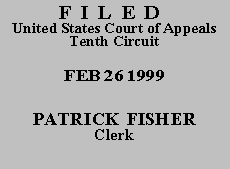

| JOSEPH WAYNE LYDA,
Petitioner-Appellant, v. GARY E. GIBSON, Warden of the Oklahoma State Penitentiary, Respondent-Appellee. |
|
Petitioner-appellant Joseph Wayne Lyda appeals from the district court's order denying his petition for writ of habeas corpus which he brought pursuant to 28 U.S.C. § 2254. We previously granted a certificate of appealability, see 28 U.S.C. § 2253(c), and we now affirm.
Petitioner was convicted by an Oklahoma jury of second degree murder and sentenced to life imprisonment. In this appeal, he challenges the Oklahoma trial court's denial of his request for a self-defense instruction.
A federal court may only grant habeas relief to a person in state custody if he shows that he is in custody "in violation of the Constitution or laws or treaties of the United States." 28 U.S.C. § 2254(a). No authority is granted to federal courts to correct errors of state law made by state courts. See Jackson v. Shanks, 143 F.3d 1313, 1317 (10th Cir.), cert. denied, 119 S. Ct. 378 (1998).
We employ a highly deferential standard of review in evaluating the state trial court's refusal to deliver [a] requested self-defense instruction. As a general rule, errors in jury instructions in a state criminal trial are not reviewable in federal habeas corpus proceedings, unless they are so fundamentally unfair as to deprive petitioner of a fair trial and to due process of law.
Tyler v. Nelson, 163 F.3d 1222, 1227 (10th Cir. 1999) (citations and quotations omitted). Moreover, "[t]he burden of demonstrating that an erroneous instruction was so prejudicial that it will support a collateral attack on the constitutional validity of a state court's judgment is even greater than the showing required to establish plain error on direct appeal." Henderson v. Kibbe, 431 U.S. 145, 154 (1977).
Petitioner argues that there was sufficient evidence, under Oklahoma law, to warrant the giving of a self-defense instruction and that the state court's refusal to give it deprived him of due process by preventing him from arguing his theory of the case to the jury. In order to be entitled to habeas relief, however, he must go further and show that failure to give the instruction, under the circumstances of his case, resulted in a "serious miscarriage of justice." Nickerson v. Lee, 971 F.2d 1125, 1138 (4th Cir. 1992) (quotation omitted); see also Maes v. Thomas, 46 F.3d 979, 985 (10th Cir. 1995). Having carefully reviewed the record, we conclude that petitioner has failed to show a miscarriage of justice from the failure to give the requested instruction. We therefore deny habeas relief on his due process claim.
Petitioner also argues that the district court violated his right to avoid incriminating himself by conditioning his receipt of a self-defense instruction on his willingness to testify. We reject his claim, because the record does not bear out his contention that the state court required him to testify in order to receive the instruction.
Petitioner's counsel did not mention self-defense in his opening statement. He told the jury that the evidence would show that he killed his victim in the heat of passion and was at most guilty of manslaughter. See Appellant's App. at 53. After both sides had rested, however, petitioner's counsel informed the court that he was considering asking for a self-defense instruction. The court replied, "But your man has to take the stand, doesn't he, and--or somebody has to tell--" id. at 245 (emphasis added). Counsel replied that self-defense could reasonably be inferred from the evidence. At the jury instruction conference the next day, the court rejected petitioner's proffered self-defense instruction. The court outlined the evidence pertaining to petitioner's claim of self-defense, finding it insufficient to justify the instruction, and also noted that "self-defense has not been mentioned up to this point in the trial." Id. at 253.
We cannot conclude from these facts that the Oklahoma trial court conditioned the giving of a self-defense instruction on petitioner's willingness to testify. Instead, the court appears to have been concerned about the sufficiency of the evidence presented to justify the giving of the instruction, whether that evidence was presented through petitioner's testimony or through cross-examination of the prosecution's witnesses and presentation of other testimony on behalf of petitioner. See, e.g., Smallwood v. State, 907 P.2d 217, 230 (Okla. Crim. App. 1995) (noting that self-defense instruction depends on evidence to support it).
Petitioner argues that the district court's reliance on his failure to mention self-defense prior to the close of the evidence indirectly penalized him for failing to testify. He contends that he could not have mentioned self-defense in his opening statement without committing himself to a theory which might not be borne out by the evidence, and that the only other way for him to bring that issue before the jury would have been to take the stand. Under Oklahoma case law, however, the trial court may consider whether a defendant referred to self-defense in his opening statement in determining whether a self-defense instruction should be given. See Cordray v. State, 268 P.2d 316, 319 (Okla. Ct. Crim. App. 1954) ("With this claim of self-defense interposed at the commencement of the trial, it is our conclusion that the court should have given a requested instruction on self-defense . . . ."). The trial court was entitled to rely on petitioner's failure to raise a claim of self-defense in his opening statement when determining whether to give the requested instruction.
The judgment of the United States District Court for the Eastern District of Oklahoma is AFFIRMED.
Entered for the Court
Circuit Judge
*. This order and judgment is not binding precedent, except under the doctrines of law of the case, res judicata, and collateral estoppel. The court generally disfavors the citation of orders and judgments; nevertheless, an order and judgment may be cited under the terms and conditions of 10th Cir. R. 36.3.